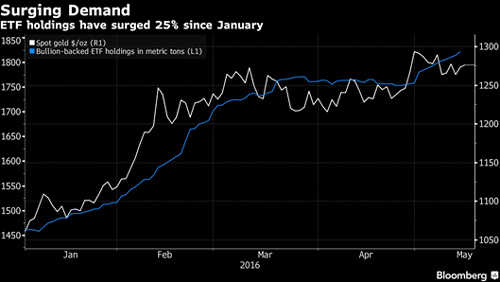Now it’s getting interesting. And no, I’m not talking about the Brexit debate. I’ll get to that in a second. I’m talking about what gold is whispering in your ear.
Gold ETF holdings rose by 63.2 tonnes in the last two weeks. And that’s while prices for the yellow metal fall. Imagine that, investors buying up an asset on price weakness. Sound like a bull market to you?
There have been three distinct phases of the gold bull market since 2002. First, it was an inflation/commodities story. That is, it was largely a US dollar story. As the dollar fell and American debt piled up, investors piled into gold.
The second phase – and by that I mean the most commonly voiced justification for buying an asset that doesn’t yield anything and costs you money to store (if you’re buying bullion) – was the “fear” trade. The more rickety and dangerous the world’s financial system became in 2007 and 2008, the more attractive a tangible asset looked.
A tangible asset is not anyone else’s promise to pay. You can put it in your sock drawer. You can put it in your pocket. Gold ticked all the boxes. And now?
If there’s a third phase to the bull market – and here I’m arguing what Charlie Morris has argued, namely that the bear market in gold is over now that it’s up over 20% from the lows at $1,050—what will drive it? What do you think? Any guesses?
If I had to pick one it would be a crisis of confidence in central banking itself. Mind you, most people don’t think about central banking at all, or at least they didn’t until the central banks became the single most important financial institutions in the world. Now people think about them, listen to them, and make financial plans based on what a central banker says in a press conference.
It’s a dangerous thing, reducing belief to a press conference. But that’s the corner the central bankers have painted themselves into. They cut interest rates to record low levels and left them there. Rate cutting as a policy tool is… well… not much of an option anymore.
All the other options look ineffective and desperate. And the more Janet Yellen, Haruhiko Kuroda, Mario Draghi and Mark Carney open their mouths, the more ordinary people realise that despite their best intentions (assuming the intentions are benevolent) these people have no idea what the long-term consequences of their unorthodox policies are.
And so smart/fearful/prudent people hedge against inflation and currency devaluation with gold. After all, we know what the short-term consequences of low rates are: credit bubbles and inflation. That we haven’t had inflation (except in the bond market, the housing market and the stockmarket) is a subject beyond the scope of today’s letter. But the gold market is a signal. For what?
It’s a signal that the people who produce paper money for a living don’t have a lot of credibility with the public. Confidence is fickle. Just watch what happens in the coming weeks with Brexit and the Bank of England.
Category: Market updates


